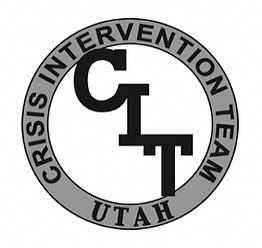|
CIT 101 | Crisis Intervention Team (CIT) programs are community-based programs that bring together law enforcement, mental health professionals, and mental health advocates to improve community responses to mental health crises. |
CIT Utah was created in 2015 as a nonprofit organization dedicated to facilitating understanding, development, and implementation of Crisis Intervention Team programs throughout the State of Utah.CIT Utah is an entity where advocating for additional funds and enhancements in supportive laws can be conducted. This organization was formed to allow the CIT Utah program to have full equity where no one agency receives benefit over another. CIT Utah organization allows the CIT Utah program to have true statewide leadership from law enforcement services, behavioral healthcare services, criminal justice services, and behavioral health advocates. Funding for CIT Utah comes from a legislative grant administered through the Sate Health Department, tuition fees, and generous donations from citizens interested in promoting best practices. CIT is community-based and improves community responses to mental health. The most visible faces of CIT are CIT officers, but CIT is not a law enforcement program. CIT is designed to bring mental health professionals, advocates, elected leaders, and others to the table to problem-solve and take responsibility for improving the mental health crisis response system—so that police and jails are not the default responders and locations. CIT programs work to build crisis response systems where law enforcement plays a supporting role and responds only when the level of danger or criminal activity warrants such a response. CIT programs also work to strengthen locations in the community where community members can walk in and receive the help they need without contact with the justice system. CIT includes people living with mental illness and their families. No one has a greater stake in the outcome of a mental health crisis than the person in crisis, followed closely by their family members. These stakeholders also have valuable insight into how the crisis response system works and what helps make it better. Only by engaging individuals with mental illness and their families can we build crisis response systems that people feel confident reaching out to those in a crisis without fear of danger or incarceration. |
CIT is based on partners coming together. CIT partners are equal decision-makers who solve problems together, bring resources to the table, and hold each other accountable. Mutual commitment, trust, and respect are the bedrock of strong partnerships.
CIT focuses on responses to mental health crises. CIT is not just about how law enforcement responds to mental health crisis situations. It also addresses how mental health professionals and other supports are involved in crisis response. CIT examines how systemic problems—like outdated policies or a lack of services—contribute to crisis situations and develops solutions to these systemic challenges.

